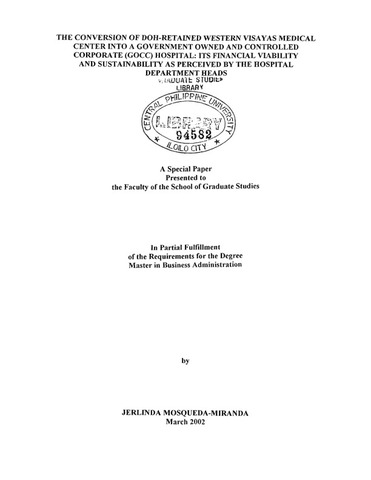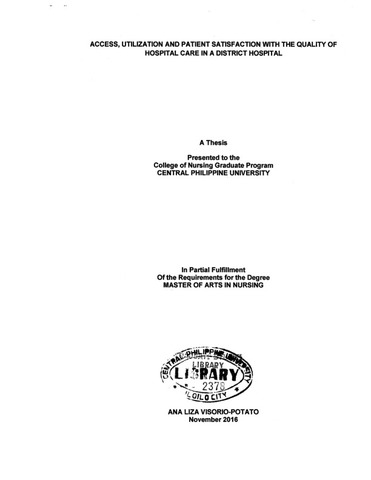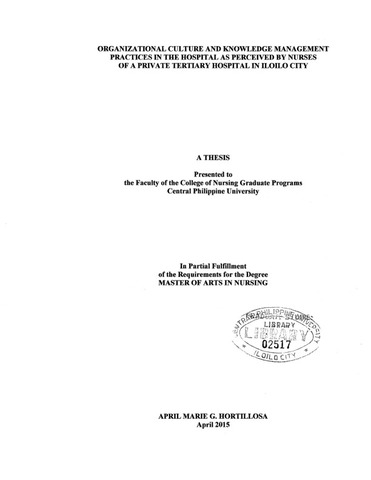Показать сокращенную информацию
The conversion of DOH-retained Western Visayas Medical Center into a government owned and controlled corporate (GOCC) hospital: Its financial viability and sustainability as perceived by the hospital department heads
| dc.contributor.adviser | Libo-on, Rowena M. | |
| dc.contributor.author | Mosqueda, Jerlinda Miranda | |
| dc.date.accessioned | 2021-10-15T05:43:42Z | |
| dc.date.available | 2021-10-15T05:43:42Z | |
| dc.date.issued | 2002 | |
| dc.identifier.citation | Mosqueda, J. M. (2002). The conversion of DOH-retained Western Visayas Medical Center into a government owned and controlled corporate (GOCC) hospital: Its financial viability and sustainability as perceived by the hospital department heads (Unpublished Master’s special paper). Central Philippine University, Jaro, Iloilo City. | en_US |
| dc.identifier.uri | https://hdl.handle.net/20.500.12852/1569 | |
| dc.description | Introduction and statement of the problem | en_US |
| dc.description.abstract | Background of the Study Medical staff or health service providers and clients or health service recipients of the Western Visayas Medical Center may not share the same perceptions concerning the advantages and disadvantages of hospital corporatization. This may create a problem in the present move to convert WVMC to a government owned and controlled corporate (GOCC) hospital. The common notion about the DOH - retained Western Visayas Medical Center being a government hospital is its humane nature and thus, its inherent characteristics of being competent, caring and culture friendly health service provider. However, there are some apprehensions that upon its conversion into a government owned and controlled corporate (GOCC) hospital, the inevitable shift in its primary focus from being a health service provider into an income generating corporate entity, would certainly result in the loss of its humane nature to the detriment of its clientele. Certain sectors, however, claimed that these apprehensions have no reasonable basis. They argued that corporatization is in fact a strategy that would ensure the preservation of the right of the people to health services. Past experiences have shown that the DOH - retained Western Visayas Medical Center has been constrained to fulfill its humane mission due to their inadequate financial condition. This financial inadequacy has been attributed to various reasons. First, it lacks access to other sources of funds. Second, the operations of the DOH - retained WVMC are solely dependent on government subsidies, which are oftentimes inadequate to meet its needs. Third, its only source of revenue to augment its finances is the minimal fees charged for some medical services yet they are criticized by patients mostly indigents, who believed that they are entitled to free services and medicines. Fourth, the DOH - retained WVMC is subject to government regulations, which require that all revenues should be remitted immediately to the national treasury. Fifth, only part of the revenues remitted to the national treasury could be released back to the WVMC due to some restriction. The use of its revenues is only possible after complying a complete cycle of remittance to the national treasury and request from the Department of Budget and Management (DBM). A corporatized Western Visayas Medical Center is immune from the aforementioned constraining factors, thus it could effectively and efficiently fulfill its humane mission to ensure the preservation of the people’s right to health services. Basing on the report of the Task Force on Hospital Corporatization (2000), it could be safe to state that a corporatized Western Visayas Medical Center will be financially viable and sustainable. This financial viability and sustainability is due to the following reasons: First, corporatization opens up the government hospital to more sources of funds, making them more independent on government subsidy. Second, it will provide government hospital more financial latitude in addressing and prioritizing its needs. Third, all the income will revert back automatically to the hospital for the improvement of the quality of services including the treatment of indigent patients, which would not be possible in DOH - retained hospital with its restricted use of its revenue. Fourth, it gives the hospital greater managerial and fiscal autonomy. The financial viability and sustainability of a corporatized Western Visayas Medical Center has been assumed considering the hypothetical bases mentioned above. There is a need therefore to confirm this assumption based on the perceptions of knowledgeable people regarding this matter. This study, was thus, conceived to find out how the hospital heads of Western Visayas Medical Center perceived the conversion of the hospital into a government owned and controlled corporate (GOCC) hospital in terms of its financial viability and sustainability. General Objective The main objective of the research was to determine the perception of hospital department heads on the conversion of DOH - retained Western Visayas Medical Center to a government owned and controlled corporate hospital in terms of its financial viability and sustainability. Specific Objectives The specific objectives of the study were as follows: 1. What are the perceptions of the WVMC department heads on the financial viability and sustainability of this DOH - retained hospital when converted to a government owned and controlled corporate hospital when these hospital department heads are taken as an entire group and when they are classified according to their sex, age, civil status, salary graded and monthly salary? 2. Do the sex, age, civil status salary grade and monthly salary of Western Visayas Medical Center hospital department heads significantly influence their perception on the financial viability and sustainability of the DOH - retained WVMC when converted to a government owned and controlled corporate hospital? | en_US |
| dc.format.extent | 67 leaves | en_US |
| dc.language.iso | en | en_US |
| dc.subject.ddc | GSL Theses 650.072 M673 | en_US |
| dc.subject.lcsh | Public hospitals | en_US |
| dc.subject.lcsh | Public hospitals--Finance | en_US |
| dc.subject.lcsh | Feasibility studies | en_US |
| dc.subject.lcsh | Hospital administrators | en_US |
| dc.subject.lcsh | Sustainability | en_US |
| dc.title | The conversion of DOH-retained Western Visayas Medical Center into a government owned and controlled corporate (GOCC) hospital: Its financial viability and sustainability as perceived by the hospital department heads | en_US |
| dc.type | Special paper | en_US |
| dc.description.bibliographicalreferences | Includes bibliographical references | en_US |
| dc.contributor.chair | David, Fely P. | |
| dc.contributor.department | School of Graduate Studies | en_US |
| dc.description.degree | Master in Business Management | en_US |
| local.subject | Western Visayas Medical Center (WVMC) | en_US |





